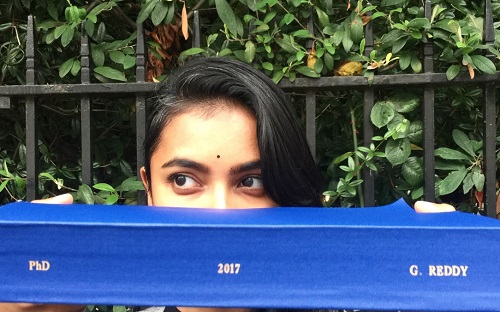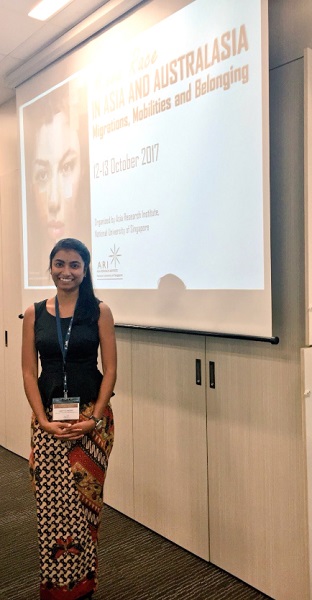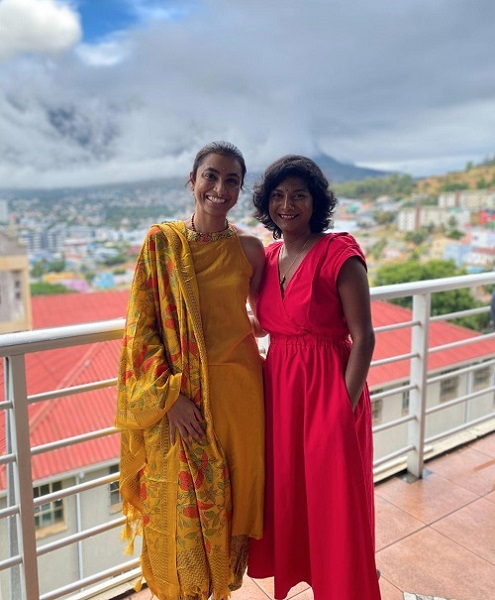Tracing My Roots While Exploring Coloniality
By Dr Geetha Reddy
Geetha reflects on their journey as a person with Indian ancestry and diasporic identity. They discuss how this personal connection shapes their understanding of colonial legacies in Malaysia, especially the marginalization of Malaysian Indian women, drawing parallels to their academic work
What I really am, is a time traveller. I enter the past through the stories of elders, colonial archives and songs written about the rich history of our foreparents. I remain present, observing the course that the past takes to structure our lives today. I travel to the future when I plant seeds for a time where the most marginalised amongst us are truly free.
My work as an academic, in particular, as Principal Investigator of the EXCAPE URMI project most visibly showcases my explorations of coloniality. I seek to understand how the legacies of colonialism, set in place by British, Dutch, and Portuguese colonial administrators in India, Malaysia and Singapore, continue to orient my social worlds. How does coloniality of gender influence the way I present myself? How does coloniality of knowledge structure what I learnt in various educational institutions? How does it affect what I can teach in the classroom? How does coloniality of being impact the way that my colleagues and I interact with one another?
Let me introduce myself again for this is the position I speak and write from. I, Geetha (they/them/she/her/), am a queer multiracial person born in Singapore. My mother is Telugu and her ancestry can be traced back to two villages in Madurai, Tamil Nadu. My father is Peranakan, and his ancestors still have homes in Malacca. I feel at home in both places and several others across this planet, my rootedness to my diasporic Tamil, Telugu and Peranakan identity facilitating connections for me from Göttingen, Germany to Durban, South Africa.
I use my multidimensional existence across space and time to guide my thinking on antiracist praxes that I want to embody. I exist in London and I exist in Malaysia, albeit my privileges and marginalisations change drastically. Past, present, and future me all exist at the same time in that I am aware of how racism is cyclical, constantly evolving, and (currently) existing in all of the dimensions in which my ancestors, future generations, and I exist. Fortified and nourished by Black feminist decolonial scholars around the world, I ground myself in establishing solidarities across struggles and acts of resistance. I am guided by an African-centered, liberation-focused, trauma- informed, antiracist, anti-capitalist, anti-caste, gender-fluid, and decolonial psychological map for the creation of expansive, radically free and justice-directed future worlds.
I came to this realisation of myself when I wanted to understand how racial identities are constructed and reconstructed amongst Malaysians and Singaporeans for my doctoral studies. I spoke to over 600 people for my doctoral project, meeting them in person, online and through the medium of online questionnaires. Everyone, in some shape or form, is trying to trace their own roots. At times, they are focused on deepening these roots. In other times, they are seeking to uproot themselves and plant themselves elsewhere — both physically and psychologically.

Having met and worked with femmes and women of Indian origin around the world, I was struck by the threads that connected us. Similar stories of having to meet cultural expectations of Indian womanhood, battling (and sometimes, winning against) patriarchy and coming into their whole selves. Diasporic femmes and women especially, grounding themselves in lands too foreign for their taste buds but too familiar for their comfort for their differences are magnified, prodded and labelled. It is this desire to continue weaving these threads together that fuels the EXCAPE URMI project. It is my wish that we realise that we are not alone in our battles and that dismantling coloniality requires that all of us work together.


டாக்டர் கீதா ரெட்டியின் காலனித்துவத்தின் வேர்களைக் கண்டறிதல்
கீதா அவரின் பயணத்தில் இந்திய வம்சாவளி மற்றும் புலம்பெயர்ந்த அடையாளத்துடன் அவர்களின் பயணத்தை பிரதிபலிக்கிறார். இந்த தனிப்பட்ட தொடர்பு மலேசியாவில் காலனித்துவ மரபுகள் பற்றிய அவர்களின் புரிதலை எவ்வாறு வடிவமைக்கிறது, குறிப்பாக மலேசிய இந்தியப் பெண்களை அவர்களின் கல்விப் பணிகளில் ஒதுக்கி வைப்பது ஆகியவற்றை அவர்கள் விவாதிக்கின்றனர்.
நான் உண்மையில் ஒரு காலப்பயணி. பெரியவர்களின் கதைகள், காலனித்துவ ஆவணங்கள் மற்றும் நம் முன்னோர்களின் வளமான வரலாற்றைப் பற்றி எழுதப்பட்ட பாடல்கள் மூலம் நான் கடந்த காலத்திற்குள் நுழைகிறேன். இன்று நம் வாழ்க்கையை கட்டமைக்க கடந்த காலம் எடுக்கும் போக்கை அவதானித்து நான் தற்போது போகிறேன். நம்மில் பலர் சுதந்திரமாக வாழப் போகும் அந்த எதிர்காலத்திற்கு விதை போட்டு நான் அதனை தேடி பயணிக்கிறேன்.
ஒரு கல்வியாளராக, குறிப்பாக, EXCAPE URMI திட்டத்தின் முதன்மை ஆய்வாளராக எனது பணி காலனித்துவம் பற்றிய எனது ஆய்வுகளை மிகத் தெளிவாகக் காட்டுகிறது. இந்தியா, மலேசியா மற்றும் சிங்கப்பூரில் உள்ள பிரிட்டிஷ், டச்சு மற்றும் போர்த்துகீசிய காலனித்துவ நிர்வாகிகளால் நிறுவப்பட்ட காலனித்துவத்தின் மரபுகள், எனது சமூகத்தில் எவ்வாறு பின்பற்ற படுகின்றது என்பதைப் புரிந்துகொள்ள முயல்கிறேன். பாலினத்தின் காலனித்துவம் நான் முன்வைக்கும் விதத்தை எவ்வாறு பாதிக்கிறது? பல்வேறு கல்வி நிறுவனங்களில் நான் கற்றதை அறிவு கட்டமைப்பின் காலனித்துவம் எவ்வாறு கட்டமைக்கிறது? வகுப்பறையில் நான் கற்பிப்பதை இது எவ்வாறு பாதிக்கிறது? நானும் எனது சக பணியாளர்களும் ஒருவருக்கொருவர் தொடர்பு கொள்ளும் விதத்தில் காலனித்துவம் எவ்வாறு தாக்கத்தை ஏற்படுத்துகிறது?
நான் பேசுவதும் எழுதுவதும் இந்த நிலையில் இருந்து என்னை மீண்டும் அறிமுகப்படுத்துகிறேன். நான், கீதா (அவர்கள்/அவர்கள்/அவள்/அவள்/), சிங்கப்பூரில் பிறந்த ஒரு வினோதமான பல இனத்தவர். என் அம்மா தெலுங்கு மற்றும் அவரது வம்சாவளியை தமிழ்நாட்டின் மதுரையில் உள்ள இரண்டு கிராமங்களில் காணலாம். எனது தந்தை பெரனாகன், அவருடைய முன்னோர்களுக்கு இன்னும் மலாக்காவில் வீடுகள் உள்ளன. நான் இரண்டு இடங்களிலும் இந்த கிரகம் முழுவதும் உள்ள பல இடங்களிலும் வீடுகள் இருப்பதாக உணர்கிறேன். எனது புலம்பெயர்ந்த தமிழ், தெலுங்கு மற்றும் பெரனாகன் அடையாளத்திற்கான எனது வேரூன்றியமை, ஜெர்மனியின் கோட்டிங்கனில் இருந்து தென்னாப்பிரிக்காவின் டர்பன் வரையிலான தொடர்புகளை எளிதாக்குகிறது.
நான் உருவாக்க விரும்பும் இனவெறிக்கு எதிரான நடைமுறைகள் பற்றிய எனது சிந்தனையை வழிநடத்த இடம் மற்றும் நேரம் முழுவதும் எனது பல பரிமாண இருப்புகளைப் பயன்படுத்துகிறேன். சில நேரங்களில் நான் லண்டனிலும் இருப்பேன் மலேசியாவிலும் இருப்பேன். இருப்பினும், எனது சலுகைகள் மற்றும் ஓரங்கட்டல்கள் கடுமையாக மாறுகின்றன. கடந்த காலம், நிகழ்காலம் மற்றும் எதிர்காலம் என அனைத்தும் ஒரே நேரத்தில் உள்ளன.தற்போதைய காலக்கட்டத்திலும், இனவெறி நம் வாழ்வை ஆக்ரமிக்கிறது, தொடர்ந்து உருவாகி வருகிறது என்பதை எனது முன்னோர்கள், வருங்கால சந்ததியினர் மற்றும் நான் இருக்கும் பரிமாணங்கள் அனைத்திலும் உள்ளது என்பதை நான் அறிவேன். உலகெங்கிலும் உள்ள கறுப்பின பெண்ணிய காலனித்துவ அறிஞர்களால் பலப்படுத்தப்பட்டு வளர்க்கப்பட்டு, போராட்டங்கள் மற்றும் எதிர்ப்புச் செயல்களில் ஒற்றுமையை நிலைநாட்டுவதில் நான் என்னை நிலைநிறுத்திக் கொள்கிறேன். விரிவான, தீவிரமான சுதந்திரமான மற்றும் நீதியை வழிநடத்தும் எதிர்கால உலகங்களை உருவாக்குவதற்கான ஆப்பிரிக்க-மையப்படுத்தப்பட்ட, விடுதலையை மையமாகக் கொண்ட, அதிர்ச்சி-அறிவிக்கப்பட்ட, இனவெறி, முதலாளித்துவ எதிர்ப்பு, சாதி எதிர்ப்பு, பாலின திரவம் மற்றும் காலனித்துவ உளவியல் வரைபடத்தால் நான் வழிநடத்தப்படுகிறேன்.
எனது முனைவர் பட்ட ஆய்வுகளுக்காக மலேசியர்கள் மற்றும் சிங்கப்பூரர்களிடையே இன அடையாளங்கள் எவ்வாறு கட்டமைக்கப்படுகின்றன மற்றும் புனரமைக்கப்படுகின்றன என்பதைப் புரிந்துகொள்ள விரும்பியபோது என்னைப் பற்றிய இந்த புரிதல் எனக்குள் ஏற்பட்டது. எனது முனைவர் பட்ட திட்டத்திற்காக 600 பேரிடம் பேசினேன், அவர்களை நேரிலும், ஆன்லைனிலும், ஆன்லைன் கேள்வித்தாள்கள் மூலமாகவும் பல கேள்விகளை எழுப்பினேன். ஒவ்வொருவரும், ஏதோ ஒரு வடிவத்தில் தங்களின் அடையாளங்களை கண்டறிய முயற்சிக்கிறார்கள். சில நேரங்களில், அவர்கள் இந்த அடையாளங்களைக் கண்டறிவதில் கவனம் செலுத்துகிறார்கள். உடல் ரீதியாகவும் உளவியல் ரீதியாகவும் மற்ற நேரங்களில் அவர்கள் தங்களை வேரோடு பிடுங்கி வேறு இடங்களில் தங்களை விதைக்க முற்படுகிறார்கள்.
உலகெங்கிலும் உள்ள இந்திய வம்சாவளியைச் சேர்ந்த பெண்களும் சாதரண பெண்களுடனும் பணியாற்றியதால், அவர்களுடன் ஒன்றோடு ஒன்றாக இணைக்கப்பட்டேன். இந்தியப் பெண்மையின் கலாச்சார எதிர்பார்ப்புகளைப் பூர்த்தி செய்ய வேண்டும், ஆணாதிக்கத்தை எதிர்த்துப் போராடி (மற்றும் சில சமயங்களில் வெற்றி பெறுவது) மற்றும் அவர்களின் முழு சுயத்திற்குள் வருவது போன்ற கதைகள் குறிப்பாக, இத்தகைய பெண்கள்அந்நியமான நாடுகளில் தங்களைத் தாங்களே நிலை நிறுத்திக் கொள்கிறார்கள், ஆனால், அவர்களின் தனித்துவத்திற்காகவும் , வேறுபாட்டிற்காகவும், வசதிக்காகவும் அவர்கள் உயர்வாக பார்க்கப்படுகிறார்கள். இந்த இழைகளைத் தொடர்ந்து நெசவு செய்ய வேண்டும் என்ற இந்த ஆசைதான் EXCAPE URMI திட்டத்தைத் தூண்டுகிறது. மேலும் நமது போர்களில் நாம் தனியாக இல்லை என்பதையும், காலனித்துவத்தை தகர்க்க நாம் அனைவரும் ஒன்றிணைந்து செயல்பட வேண்டும் என்பதையும் உணர வேண்டும் என்பதே எனது விருப்பம்.



Menyusuri Akar Saya Sambil Meneroka Kolonialiti oleh Dr.Geetha Reddy
Geetha merenungkan perjalanan mereka sebagai individu dengan keturunan India dan identiti diaspora. Mereka membincangkan bagaimana hubungan peribadi ini membentuk pemahaman mereka terhadap legasi kolonial di Malaysia, terutamanya peminggiran wanita India Malaysia, dengan menarik persamaan kepada karya akademik mereka.
Saya sebenarnya adalah seorang pengembara masa. Saya memasuki masa lalu melalui cerita-cerita orang tua, arkib kolonial dan lagu-lagu yang ditulis tentang sejarah kaya nenek moyang kita. Saya tetap hadir, memerhati perjalanan masa lalu yang membentuk hidup kita hari ini. Saya mengembara ke masa depan apabila saya menanam benih untuk suatu masa di mana mereka yang paling terpinggir di kalangan kita benar-benar bebas.
Kerja saya sebagai ahli akademik, khususnya, sebagai Penyiasat Utama projek EXCAPE URMI paling jelas menunjukkan penerokaan penjajahan saya. Saya ingin memahami bagaimana warisan kolonialisme, yang ditetapkan oleh pentadbir kolonial British, Belanda dan Portugis di India, Malaysia dan Singapura, terus mengorientasikan dunia sosial saya. Bagaimanakah penjajahan jantina mempengaruhi cara saya mempersembahkan diri saya? Bagaimanakah penjajahan ilmu menstrukturkan apa yang saya pelajari di pelbagai institusi pendidikan? Bagaimanakah ia mempengaruhi perkara yang boleh saya ajar di dalam bilik darjah? Bagaimanakah penjajahan mempengaruhi cara saya dan rakan sekerja saya berinteraksi antara satu sama lain?
Izinkan saya memperkenalkan diri sekali lagi kerana ini adalah kedudukan dari mana saya bercakap dan menulis. Saya Geetha (mereka/dia), adalah seorang individu queer multirasial yang dilahirkan di Singapura. Ibu saya adalah orang Telugu dan keturunannya boleh dikesan kembali ke dua kampung di Madurai, Tamil Nadu. Bapa saya adalah Peranakan, dan nenek moyangnya masih mempunyai rumah di Melaka. Saya merasa di rumah di kedua-dua tempat tersebut dan beberapa tempat lain di seluruh dunia ini, dengan keterikatan saya pada identiti Tamil, Telugu, dan Peranakan diaspora memudahkan saya untuk menjalin hubungan dari Göttingen, Jerman hingga Durban, Afrika Selatan.
Saya menggunakan kewujudan multidimensi saya merentas ruang dan masa untuk membimbing pemikiran saya mengenai amalan antirasis yang ingin saya wujudkan. Saya wujud di London dan saya wujud di Malaysia, walaupun hak istimewa dan peminggiran saya berubah dengan drastik. Saya masa lalu, masa kini, dan masa depan saya semuanya wujud pada masa yang sama kerana saya sedar bagaimana perkauman adalah bersifat kitaran, sentiasa berkembang, dan (sekarang) wujud dalam semua dimensi di mana nenek moyang saya, generasi masa depan, dan saya wujud. Dikuatkan dan diberi makan oleh sarjana feminis kulit hitam dekolonial di seluruh dunia, saya meneguhkan diri saya dalam mewujudkan solidariti merentas perjuangan dan tindakan penentangan. Saya dibimbing oleh peta psikologi yang berpusatkan Afrika, berfokuskan pembebasan, berasaskan trauma, antirasis, anti-kapitalis, anti-kasta, gender-fluid, dan dekolonial untuk penciptaan dunia masa depan yang luas, bebas secara radikal dan dipandu oleh keadilan.
Saya datang kepada penyedaran ini tentang diri saya apabila saya ingin memahami bagaimana identiti perkauman dibina dan dibina semula di kalangan rakyat Malaysia dan Singapura untuk pengajian doktoral saya. Saya bercakap dengan lebih 600 orang untuk projek doktoral saya, bertemu mereka secara peribadi, dalam talian dan melalui medium soal selidik dalam talian. Setiap orang, dalam bentuk atau cara tertentu, cuba mengesan akar mereka sendiri. Kadang-kadang, mereka fokus untuk memperdalamkan akar ini. Pada masa lain, mereka mencari untuk mencabut diri mereka dan menanamkan diri mereka di tempat lain — baik secara fizikal mahupun psikologi.

Setelah bertemu dan bekerja dengan wanita femes dan wanita asal India di seluruh dunia, saya terpesona dengan benang yang menghubungkan kami. Kisah yang sama tentang perlu memenuhi jangkaan budaya kewanitaan India, berjuang (dan kadangkala, menang melawan) patriarki dan datang ke dalam diri mereka secara keseluruhan. Diaspora femmes dan wanita terutamanya, membumikan diri mereka di tanah yang terlalu asing untuk citarasa mereka tetapi terlalu biasa untuk keselesaan mereka untuk perbezaan mereka diperbesarkan, didorong dan dilabel. Keinginan untuk terus menganyam benang ini bersama-sama yang menyemarakkan projek EXCAPE URMI. Adalah menjadi harapan saya agar kita sedar bahawa kita tidak bersendirian dalam pertempuran kita dan bahawa memusnahkan penjajahan memerlukan kita semua bekerjasama.


Request your prospectus
![]()
Explore our qualifications and courses by requesting one of our prospectuses today.